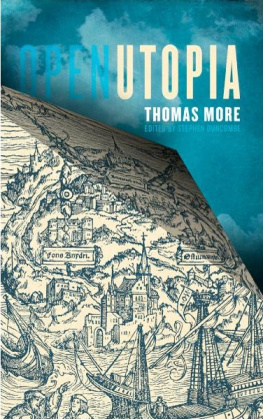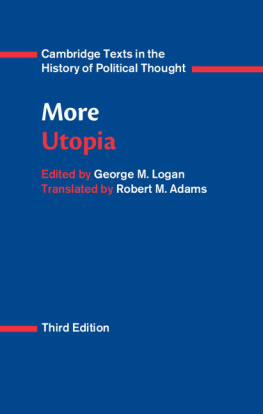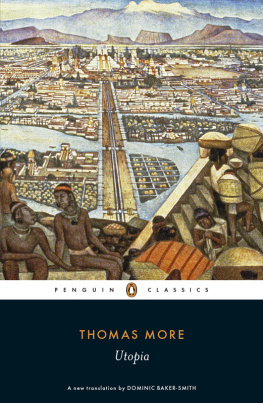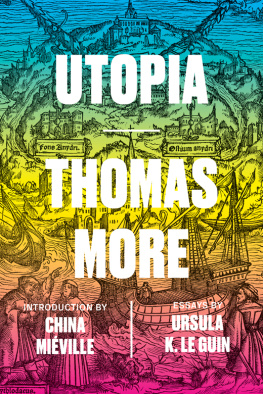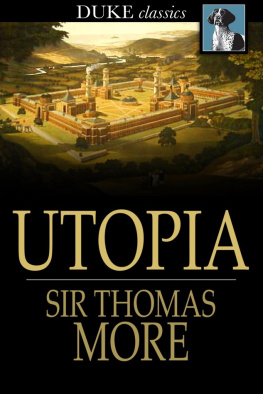UTOPIA
UTOPIA
SECOND EDITION
Thomas More
TRANSLATED AND INTRODUCED BY
CLARENCE H. MILLER
WITH A NEW AFTERWORD BY
JERRY HARP

Published with assistance from the foundation established in memory of Oliver Baty Cunningham of the Class of 1917, Yale College.
Afterword and Suggestions for Further Reading copyright 2014 by Yale University. Translation copyright 2001 by Clarence H. Miller.
All rights reserved.
This book may not be reproduced, in whole or in part, including illustrations, in any form (beyond that copying permitted by Sections 107 and 108 of the U.S. Copyright Law and except by reviewers for the public press), without written permission from the publishers.
Yale University Press books may be purchased in quantity for educational, business, or promotional use. For information, please e-mail sales.press@yale.edu (U.S. office) or sales@yaleup.co.uk (U.K. office).
Designed by Rebecca Gibb. Set in Adobe Garamond type by Keystone
Typesetting, Inc.
Printed in the United States of America.
Library of Congress Control Number: 2012954304
ISBN 978-0-300-18610-9 (pbk.)
A catalogue record for this book is available from the Library of Congress and from the British Library.
10 9 8 7 6 5 4 3 2 1
CONTENTS
INTRODUCTION
The circumstances under which More composed Utopia, as he recounts them in the opening of the book, give us some clues about one of its central issues: public service versus contemplative withdrawal. More was a busy London lawyer in the service of Henry VIII on a trade commission negotiating in the spring and early summer of 1515 in Bruges. In the midst of this activity came three months of leisure from late July to late October; the negotiations were interrupted because the Flemish ambassadors had to return to consult with their prince. Released from business and public service, More had time for thought and contemplation: he wrote what would become the second book of Utopia, a description of the island and its people, customs, and form of governmenta sort of fantastic, Lucianic travelogue. After he returned home he wrote the first book, a semi-Platonic dialogue framework concerning the question of whether it is useful to serve as the counsellor of a prince. The first book, in other words, argues about the alternatives of engagement or retreat.
Unlike Platonic dialogues, which reach solutions, or even Ciceronian dialogues, which are more open-ended but clearly suggest the superiority of one outlook, the first book of Utopia comes to no conclusion. It does not take long for the reader to see that Hythloday (whose name means peddler of nonsense) contradicts his position by telling the story of his sojourn in the court of Cardinal Morton, who listens to Hythlodays advice about punishing thieves and suggests that it might be tried in a modified form. Nor does he defeat More in the argument about the necessity of communism; he simply evades it by insisting that More would agree with him if he had seen how communism has transformed the good place, Utopia. But unfortunately the good place is also no place. And not everything about the good place is good: apart from its policies on euthanasia and divorce, which might be tolerated in a non-Christian society, it practices capital punishment with a harshness not far from what Hythloday condemns in Book 1; its military and especially its colonial policies also leave much to be desired. At the end of Book 2 we are left with Hythlodays passionate condemnation of the outrageous social injustices of European society, but we are not really any closer to believing that they could be cured by communism, partly because we know that it has never been introduced in society as a whole and never could be, and we are never told how it was introduced or sustained in Utopia. Even if we thought it might work in Western nations, would we want to live in such a faceless and regimented society? The citizens sometimes seem like robots; the houses and even the cities seem almost interchangeable. Apart from Utopus, we never learn the name of a single Utopian. Did Hythloday never have any special friends there? One could say that he is not interested in autobiography but only in the Utopians economic, social, and political institutions, but should children simply be taken from their parents and moved to a different family? Should whole populations be shifted back and forth to the continental colonies to provide demographic stability?
Such facts and questions make us realize that Mores Utopia does not fit the ordinary meaning of the word as it came down in modern languages, where it signifies an unreservedly good place (though it still includes the notion that it is no place, that it can never be actualized).to try to find out what they approve or disapprove of and why. To quote from Edward Surtzs acute and comprehensive introduction to an earlier Yale translation of Utopia:
Is the success of Utopia due to dialogue? After all, dialogue is symbolic of open-mindedness, humility, and inquiry. Somehow or other, More succeeds in involving readers in the dialogue. It is no accident that Utopia ends with challenges. Is the Utopian view of war, religion, and communism really absurd? Is the Utopian vision really hopeless and unachievable? Utopia therefore is an open-ended workor, better, a dialogue with an indeterminate close. More asks the right questions which can never be answered fully.
The central character of the book, and the real Mores most original character, is of course Hythloday, who practically identifies himself with Utopia, to which he is unreservedly committed. His names suggest the bipolarity of his character. He is Raphael (Gods healer), and Hythloday (the peddler of nonsense): on the one hand a passionate analyst of social injustice, an intense and outraged defender of the oppressed, the poor, the sick, and the weak, a proponent of freedom from crushing toil, an enthusiastic promoter of intellectual pursuits, a supporter of equal rights for women; on the other hand, he is an advocate of inhuman social engineering, colonial exploitation, assassination, bloody warfare (however brief), ethnic cleansing of the Zapoletes, and capital punishment for someone who commits adultery twice. He is narrow-minded, unrealistic, humorless, puritanical, stubborn, tactless, andaccording to some of his criticseven self-indulgent and narcissistic. And yet he is an energetic, credible character, whom we do not find entirely admirable or entirely repellent, like Utopia itself. But also like Utopia, he is always intense and intriguing. He asks and answers important questions, and however much or little we may like his answers, he makes us aware of the urgency of the questions.
The way Hythloday speaks reflects his character and ideas, and some of the range and tensions of his style can be perceived even in a translation. Hythlodays sentences range from turbulent and often strained complexity, when he is contrasting Europe with Utopia, to simple, straightforward ease when he is describing Utopia.
When Hythloday imagines a session of the French kings council and projects the advice he would give, he launches into a 464-word sentencesuspended, unrealistically intricate, almost interminableand ends by asking More, How do you imagine, my dear More, my listeners would react to this speech? With wry understatement More replies in four words: Certainly not very favorably. Well satisfied, Hythloday takes a deep breath and soars off into another imaginary council session about raising revenues, this time in a sentence of 926 words, a syntactical extravaganza so convoluted that he himself almost loses track of it. To Hythlodays concluding inquiry, More again replies with good-humored litotes and goes on to point out, in two- or three-line sentences, that the manner of advice is as important as the matter. Among editors and commentators, so far as I know, only J. H. Lupton has pointed out these strained, overburdened sentences, and until now among English translators only Ralph Robinson attempted to reproduce them. Nowhere else did More write Latin sentences that so deliberately go beyond what ordinary Latin syntax can bear. And Hythloday does this precisely when he brings the ideal kingdoms of Achoria and Macaria, his anticipations of Utopia, into jarring and irreconcilable conflict with the military and economic corruption of Europe. The two worlds, ideal and real, collide and the ordinary syntax accepted by speakers of Latin cannot contain them.
Next page

